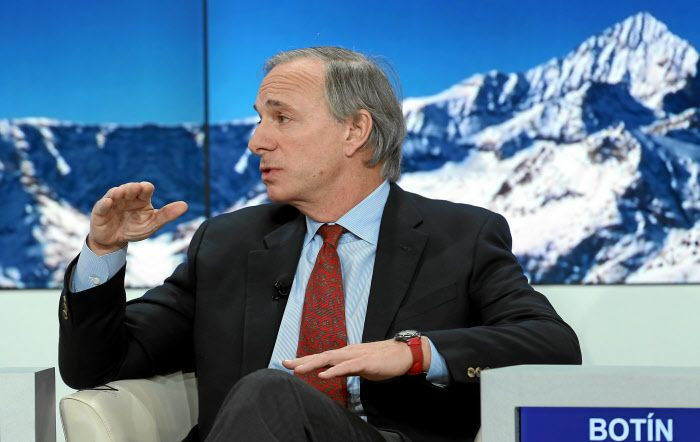Davos To Fed: Hold Your Fire On Coming Interest Rate Hikes

World leaders are meeting in the glitzy mountain resort of Davos, Switzerland, this week amid a weekslong slide in global markets. As markets plunge, so too are expectations that the U.S. Federal Reserve will continue raising interest rates when policymakers meet next week to mull the course of monetary policy in the coming year.
"This will be a negative for the economy, this market movement. The Fed should remain flexible,” Ray Dalio, founder of the hedge fund Bridgewater Associates, told CNBC Wednesday at the World Economic Forum. “It shouldn’t be so wedded to a path.”
In a December meeting, members of the Fed’s rate-setting committee tended toward an expectation of four rate hikes in 2016, following the historic decision to begin normalizing monetary policy after seven years of near-zero benchmark interest rates.
But markets have brushed off the Fed’s projections. Futures traders have priced in just a single quarter-point rise in interest rates this year, according to the Chicago Mercantile Exchange. The market sees a mere 35 percent chance that the Fed will move rates up in its March meeting.
January is all but off the table. “Generally speaking, the markets and the committee are not thinking in terms of a January move,” James Bullard, president of the Federal Reserve Bank of St. Louis, said last week, citing the slumping price of oil as a headwind on inflation.
But oil has been just one of many market indicators to move against the Fed’s path in recent months. Stock markets the world over have flashed warning signs. The FTSE 100 basket of British stocks entered bear market territory this week, falling 20 percent from its peak last April. U.S. stocks, meanwhile, have posted the weakest-ever start to a year, with the Dow Jones falling at least 250 points in half of the trading days of 2016.
Markets are reacting to some of the same indicators that could stay the Fed’s hand in coming months. The fall in energy prices has weighed on consumer prices, pushing core inflation measures well below the Fed’s 2 percent target. China’s declining economic growth, meanwhile, continues to rattle investors concerned that the world’s second-largest economy will crater export demand the world over.
Earlier this month, Boston Fed President Eric Rosengren said the combination of economic headaches were “furthering the concern that global growth has slowed significantly.” Charles Evans, head of the Chicago Fed, echoed the sentiment regarding China: “It’s something that makes you nervous.”
At Davos, Dalio worried that market mayhem would turn into a major drag on the economy. “We're going to have a lower level of growth in six months from now,” Dalio said, predicting a 1.5 percent drop in economic output.
On Thursday, officials at the European Central Bank elected to keep interest rates in the eurozone stead. Speaking to press, ECB chief Mario Draghi cited the market's recent turbulence. “These conditions have worsened, and I think the credibility of the ECB would be harmed if we were not ready to review and possibly reconsider our monetary policy stance when we will have full information.”
Still, others have cautioned against reading global market disturbances into underlying economic activity. The International Monetary Fund released projections this week putting global economic growth at 3.4 percent, a slight increase over its 2015 estimate of 3.1 percent growth.
Though U.S. manufacturing has been hit by softening demand from China and a stronger dollar — which drags on exports — the domestic economy is sound. Automotive sales saw a record high last year, and overall consumer spending has remained strong.
“We don’t see this as a big fundamental shift in terms of the market,” Citigroup Chief Executive Michael Corbat told Bloomberg at Davos Thursday, referring to recent downdrafts in equities and commodities. Still, Corbat cautioned the Fed to hold steady for the time being.
But Mary Callahan Erdoes, head of JPMorgan's asset management division, told Bloomberg that the Fed should remain on its normalization path, noting that further rate hikes would “send a lot of confidence to the world.”
For his part, Dalio argued the Fed should do just the opposite, not only halting rate hikes but resuming quantitative easing, which refers to the Fed's post-crisis policy of infusing cash into the financial markets to stimulate growth.
Dalio's comments, however, spoke more to sentiment than economics. “I think a move to a quantitative easing would bolster psychology,” Dalio said. “Every country in the world needs an easier monetary policy.”
© Copyright IBTimes 2025. All rights reserved.






















